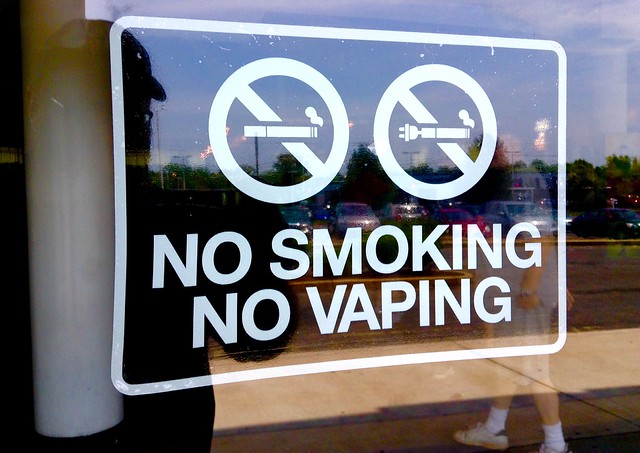The vaping ‘epidemic’ and youth addiction
A no smoking, no vaping sign on storefront.
April 30, 2019
The Juul vaping device concept was co-founded by two former smokers, Adam Bowen and James Monsees according to their company website.
“They applied their background in product design to the challenge of finding a true alternative to smoking. They had been smokers for many years, but when they could find no acceptable alternative to cigarettes, Adam and James recognized a groundbreaking opportunity to apply industrial design to the smoking industry, which had not materially evolved in over one hundred years.”
Their testimonial mission statements continue on the site today and reveal that their original intention and goal with the Juul was to “improve the one billion adult smokers lives by eliminating cigarettes” since then, however, the company has had to recognize and deal with the ramifications over the fact that kids—underage kids, have become addicted to nicotine using their product.
In 2017, the Juul was everywhere, not only in the hands of the adult smokers, a fact that the two entrepreneurs insist the device was intended for— but middle school and high school students as well.
Through public outcry, legislators responding to constituent complaints, regulators and the growing number of young people addicted to nicotine, the company is revamping their image. This, on the heels of a threat from the Food and Drug Administration over the “epidemic” of youth addiction—or face product removal from shelves. According to the latest federal data, only 8% of high school students smoke cigarettes, but more than 20% vape regularly.
In their new $10 million-dollar ad campaign called “Make the Switch” Juul highlights individuals—adult individuals, living healthier happier lives since their switch from cigarettes to Juul.
While there’s no outright data on the site of exactly what’s going on with teen and underage Juul users who have become addicted, Juul claims in several areas on the site that they have never intended for their product to be for underage users, or “never smokers” and there is an immediate notification when one visits the site with regard to validating the legal age for use or purchase of a Juul device. They also talk about using responsible ad campaigns that do not market specifically to potential underage users.
The company has been sued by users, by parents of underage users and by lawmakers. The Food and Drug Administration continues to investigate whether or not the company deliberately targeted underage users and administered an unannounced inspection of the company headquarters in Nov. 2018.
Xavier Corella, a Scottsdale Community College student, began vaping when he turned 18 and told Northeast Valley News that he started when he saw all of his other friends vaping but soon stopped because he didn’t want to get addicted.
“I think that kids started and just seemed cool, to fit in, that’s what I did. I don’t think any of these kids know the actual danger of it though, they are so young and don’t understand that it has nicotine in it and that is something that many people are addicted to,” Corella said.
Getting addicted to nicotine is a serious problem and even with a Juul there are health problems that arise when people start.
Cancer.org says the studies show that many users don’t even know that nicotine is in the product and have no idea what the potential health risks they have once they start.
American Cancer Society Vice President For Tobacco Control, Cliff Douglas, was interviewed on the Cancer.org website and described the potential risks for kids that start vaping.
“They don’t understand they are being exposed to an addictive drug that also can harm a young person’s brain development, as reported in the 2016 Surgeon General’s report on e-cigarettes and youth. The brain is still developing well into the mid-20s and even beyond, so health concerns apply not only to teens, but also to college-age users.”
Kayla Encinas just graduated from high school and even as she saw other people starting to Juul she never got pressured into trying but saw the effects of it on one of her close friends.
“I never saw the point in ever trying it but my best friend started right when she turned 18 and I never see her without it. She has tried to quit but always makes an excuse about how stressed she is to start again, she’s addicted,” Encinas said.
Even if someone hasn’t started vaping there is a chance that they know someone who does “Juul.”
Just walking into a middle school or high school bathroom will likely reveal kids vaping.
College campuses, including Scottsdale Community, have their share of students who vape and carry the device with them throughout the day.
Many states have raised the age to 21 for anyone who wants to buy a Juul or the popular Juul pods.


